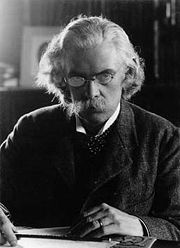Mittag-Leffler
- Mittag-Leffler
-
Gösta Mittag-Leffler
Gösta Mittag-Leffler (16 mars 1846 – 7 juillet 1927) est un mathématicien suédois. Encore jeune étudiant, il se rend à Paris (1873) pour suivre les cours de Charles Hermite dont la notoriété est grande. Mais ce dernier lui conseille modestement ceux de Weierstrass à Berlin. C'est auprès de ce dernier qu'il établira ses plus importants travaux en analyse complexe et sur les séries de fonctions. Poursuivant des travaux de Liouville, un important théorème de décomposition des fonctions méromorphes porte son nom.
Il crée en 1882 la revue Acta Mathematica où publieront les grands mathématiciens de l'époque comme Cantor ou Sophie Kowalevski. C'est grâce à Mittag-Leffler et Weierstrass que Kowalevski put se faire connaître et, en particulier, obtenir une chaire de mathématiques à l'université de Stockholm fondée en 1878 et où Mittag-Leffler fut un des premiers à enseigner.
 Portail des mathématiques
Portail des mathématiques Portail de la Suède
Portail de la Suède
Catégories : Mathématicien suédois | Naissance en 1846 | Décès en 1927
Wikimedia Foundation.
2010.
Contenu soumis à la licence CC-BY-SA. Source : Article Mittag-Leffler de Wikipédia en français (auteurs)
Regardez d'autres dictionnaires:
MITTAG-LEFFLER (G.) — MITTAG LEFFLER GÖSTA (1846 1927) Mathématicien suédois, né à Stockholm, dont les travaux portent principalement sur la théorie des équations linéaires homogènes et sur la théorie des fonctions analytiques. On lui doit notamment le célèbre… … Encyclopédie Universelle
Mittag-Leffler — Mittag Leffler, Magnus Gustav, Baron von, Mathematiker, geb. 16. März 1846 in Stockholm, wurde 1872 Privatdozent in Upsala, 1877 Professor in Helsingfors, 1881 in Stockholm. Er gründete 1882 mit Unterstützung König Oskars die internationale… … Meyers Großes Konversations-Lexikon
Mittag-Leffler — Magnus Gösta Mittag Leffler Magnus Gösta Mittag Leffler (* 16. März 1846 in Stockholm; † 7. Juli 1927 in Djursholm[1]) war ein schwedischer Mathematiker, der sich vor allem mit Analysis beschäftigte … Deutsch Wikipedia
Mittag-Leffler — Mịttag Lẹffler, Magnus Gustav (Gösta), schwedischer Mathematiker, * Stockholm 16. 3. 1846, ✝ Djursholm (bei Stockholm) 12. 7. 1927; Professor in Helsingfors und Stockholm, erweiterte v. a. die Funktionentheorie im Anschluss an C. Hermite und… … Universal-Lexikon
Mittag-Leffler star — Illustration of the Mittag Leffler star (the region bounded by the blue contour). The original disk U is centered at a. In complex analysis, a branch of mathematics, the Mittag Leffler star of a complex analytic function is a set in the… … Wikipedia
Mittag-Leffler function — In mathematics, the Mittag Leffler function Eα,β is a special function, a complex function which depends on two complex parameters α and β. It may be defined by the following series when the real part of α is strictly positive: In this case, the… … Wikipedia
Mittag-Leffler Institute — Coordinates: 59°23′44″N 18°05′06″E / 59.3956°N 18.0851°E / 59.3956; 18.0851 … Wikipedia
Mittag-Leffler-Institut — Das Mittag Leffler Institut der Königlich Schwedischen Akademie der Wissenschaften in Stockholm ist ein Forschungsinstitut für Mathematik. Es wurde 1916 von Gösta Mittag Leffler gegründet, der (zusammen mit seiner Frau Signe) dafür seine Villa… … Deutsch Wikipedia
Mittag-Leffler-Funktion — Die Mittag Leffler Funktion ist eine nach dem Mathematiker Magnus Gösta Mittag Leffler benannte mathematische Funktion, die in den Lösungen von bestimmten gebrochenen Integralgleichungen auftaucht (z. B. bei der Untersuchung von Zufallsbewegungen … Deutsch Wikipedia
Mittag-Leffler, Magnus Gösta — ▪ Swedish mathematician born March 16, 1846, Stockholm, Sweden died July 7, 1927, Stockholm Swedish mathematician who founded the international mathematical journal Acta Mathematica and whose contributions to mathematical research helped advance … Universalium


